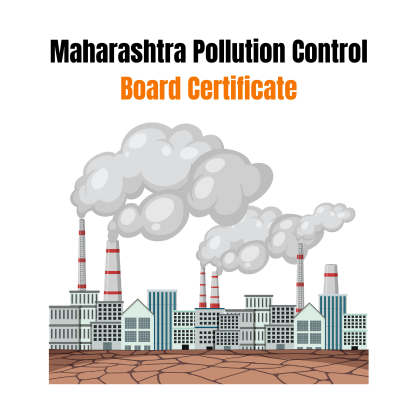Getting a certificate from the Maharashtra Pollution Control Board (MPCB) is one of the most important requirements for opening a manufacturing plant in Maharashtra. This certification guarantees that your factory's operations follow all applicable environmental laws and requirements. This is a detailed guide that will show you how to obtain an MPCB accreditation for your factory.
Importance of an MPCB Certificate
Prior to beginning, it's critical to comprehend the necessity of an MPCB certificate. This accreditation guarantees that your factory complies with environmental regulations, reducing pollution and protecting public health. Without it, there may be severe fines, plant closures, and legal problems for your factory.
Types of MPCB Certificates
MPCB issues different types of certificates based on the pollution potential of your factory:
- Consent to Establish (CTE): Required before you start construction or establishment of your factory.
- Consent to Operate (CTO): Required before starting operations after the factory is established.
- Renewal of Consent: Periodic renewal is needed to continue operations legally.
Step-by-Step Guide to Obtaining an MPCB Certificate
Step 1: Identify Your Category
MPCB classifies industries into three categories based on pollution potential:
- Red: High pollution potential (e.g., chemical manufacturing).
- Orange: Moderate pollution potential (e.g., food processing).
- Green: Low pollution potential (e.g., small-scale textile units).
Knowing your category helps in understanding the specific requirements and procedures applicable to your factory.
Step 2: Prepare Required Documents
Gather the necessary documents before applying for the certificate:
- Detailed project report: Including the nature of the project, site plan, and layout.
- Land documents: Ownership proof or lease agreement.
- Consent application form: Filled and signed.
- Environmental Impact Assessment (EIA) report: For certain projects, as specified by MPCB.
- Water and air pollution control measures: Details of the control equipment and systems in place.
- Proof of solid waste disposal method: If applicable.
Step 3: Apply for Consent to Establish (CTE)
Online Application
- Register on the MPCB website: Go to the MPCB portal and create an account.
- Fill out the application form: Provide all the required information accurately.
- Upload documents: Attach all the necessary documents mentioned above.
- Pay the fees: Make the payment online. The fee varies depending on the category and size of your factory.
- Submit the application: Once you’ve completed all the steps, submit your application online.
Offline Application
- Visit the nearest MPCB office: Collect the application form.
- Fill out and submit: Fill out the form, attach the required documents, and submit it along with the fee receipt at the office.
Step 4: Site Inspection and Scrutiny
After submitting your application, MPCB officials will conduct a site inspection. They will evaluate:
- Compliance with environmental norms: Ensuring you have measures in place to control pollution.
- Feasibility of pollution control systems: Assessing the effectiveness of your control measures.
Step 5: Grant of Consent to Establish (CTE)
You will be granted the Consent to Establish certificate if your application and site inspection satisfy MPCB requirements. With the help of this certificate, you can start building and setting up your factory.
Step 6: Apply for Consent to Operate (CTO)
You must apply for consent to Operate once your factory setup is finished. The application procedure is comparable to that of applying for CTE, except it needs more information about your factory's operating features.
Online Application
- Log in to the MPCB portal: Use your registered account.
- Fill in the CTO application form: Provide details about the operational setup.
- Upload operational documents: Include test reports, compliance certificates, and updated project details.
- Pay the fees: The fee depends on your factory’s pollution category and size.
- Submit the application: Complete and submit your application online.
Offline Application
- Collect the CTO application form: From the nearest MPCB office.
- Fill and attach documents: Complete the form and attach necessary operational documents.
- Submit the application: Submit it along with the fee receipt at the MPCB office.
Step 7: Final Inspection
MPCB officials will conduct a final inspection to ensure:
- Operational compliance: Verifying that your factory operations align with the details provided in your application.
- Effectiveness of pollution control systems: Checking if your control measures are functioning properly.
Step 8: Grant of Consent to Operate (CTO)
The consent-to-operate certificate will be issued by MPCB if your factory clears the inspection. With this certificate, you are able to legally start your business.
Step 9: Renewal of Consent
The CTO certificate is valid for a specific period, after which you must renew it. The renewal process involves:
- Submitting a renewal application: Online or offline, similar to the initial application process.
- Providing updated compliance reports: Showing continued adherence to pollution control norms.
- Paying renewal fees: As per your factory’s category and size.
For Registration Visit: Maharashtra Pollution Control Board Application
Tips for a Smooth Application Process
- Ensure accuracy: Double-check all information and documents before submission.
- Stay updated: Keep abreast of any changes in MPCB regulations and guidelines.
- Maintain compliance: Regularly monitor and upgrade your pollution control systems to stay compliant.
- Seek professional help: If needed, hire consultants who specialize in environmental compliance to assist with the application process.
To apply online to Maharashtra Pollution Control Board, click HERE
Conclusion
To ensure environmental compliance and sustainable operations, obtaining an MPCB accreditation for your plant is an essential step. With careful attention to environmental regulations and the methods listed above, you can effectively obtain the required approvals. To safeguard the environment and the public's health, compliance is a continuous effort rather than a one-time duty.






